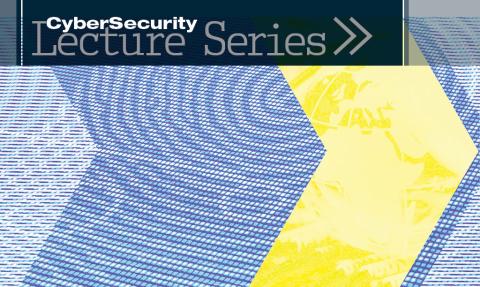event
Cybersecurity Lecture Series - Fall '16 Kick off
Primary tabs
Meet academic and industry leaders for intimate discussions about new cyber threats, trends and technologies. Preview research discoveries ahead of international conferences. Hear from exceptional Georgia Tech students about their body of work.
The weekly Cybersecurity Lecture Series is a free, open-to-the-public lecture from a thought leader who is advancing the field of information security and privacy. Invited speakers include executives and researchers from private companies, government agencies, start-up incubators as well as Georgia Tech faculty and students presenting their research.
Held weekly each Friday at Noon through Dec. 2, lectures are open to all -- students, faculty, industry, government, or simply the curious. Students may register for credit under seminar course CS-8001-INF.
Complimentary lunch provided for registered guests. Please bring your own beverage.
Sign up to receive future lecture announcements.
Featuring Nicolas Christin on Aug. 26
"Security Analytics: Bridging large-scale data collection and analysis with human factors to design better defenses"
ABSTRACT
In this talk, I will argue that understanding incentives of both attackers and targets has become critical to strengthening online security. I will advocate the need for an interdisciplinary research agenda, ranging from network measurements and large-scale data analysis to human factor modeling. Using case studies (online sale of unlicensed pharmaceutical drugs, and anonymous marketplaces), I will first describe how longitudinal, large-scale measurements and data analysis reveal important economic and structural properties of a priori complex criminal ecosystems. I will then discuss how these structural properties can be used to design successful interventions, both from a policy and from a technical angle. On the policy side, I will show that our criminal ecosystem analysis evidences "concentration points," whose disruption could effectively hamper illicit operations. On the technical side, I will demonstrate how we can use adversaries' incentives to design and build systems that can proactively identify future attack targets. I will conclude by outlining a roadmap for security research combining measurements, mathematical modeling and behavioral aspects.
BIO
Nicolas Christin is an Associate Research Professor at Carnegie Mellon University, jointly appointed in the School of Computer Science (Institute for Software Research) and in Engineering & Public Policy. He is a core faculty in CyLab, the university-wide information security institute, and also holds affiliations with the Information Networking Institute and the department of Electrical and Computer Engineering. He holds a Diplôme d'Ingénieur from École Centrale Lille, and M.S. and Ph.D. degrees in Computer Science from the University of Virginia. He was a researcher in the School of Information at the University of California, Berkeley, prior to joining Carnegie Mellon in 2005. His research interests are in computer and information systems security; most of his work is at the boundary of systems and policy research. He has most recently focused on security analytics, online crime modeling, and economics and human aspects of computer security. His group's research won several awards including Honorable Mention at ACM CHI 2011 and 2016, Best Student Paper Award at USENIX Security 2014, and Best Paper Award at USENIX Security 2016. He equally enjoys field measurements and mathematical modeling.
Groups
Status
- Workflow status: Published
- Created by: Tara La Bouff
- Created: 05/20/2016
- Modified By: Fletcher Moore
- Modified: 04/13/2017
Categories
Keywords
Target Audience



